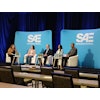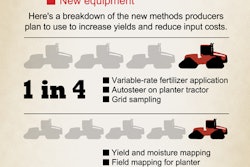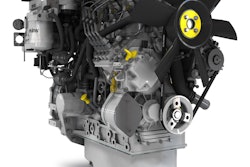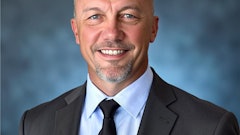CALSTART announced a nationwide campaign to expand the number of work places that are electric vehicle friendly and will enable more employers to take part in the Department of Energy’s EV Everywhere Workplace Charging Challenge. The goal of the CALSTART program is to ensure that there is at least one EV charger at a workplace for every three plug-in electric vehicles sold nationally.
“The new generation of plug-in vehicles offers employers an unprecedented opportunity to step forward and be leaders in the fight to prevent climate change and reduce the nation’s dependence on oil. EV friendly workplaces can make plug-in vehicles practical and affordable. We applaud the DOE’s challenge to employers and hope it will encourage them to take action,” says CALSTART President and CEO John Boesel.
The Employer Electric Vehicle Initiative (EEVI), to be managed by CALSTART, will be a national campaign to encourage employers to install EV charging stations and take other steps to support the use of electric vehicles by their employees. The EEVI will act as a central point of information on best practices and enable facilities managers and sustainability officers to interact and exchange information about the real world and practical issues associated with workplace charging. CALSTART has developed a website to provide information on this campaign: www.evworkplace.org.
CALSTART is already working with organizations in Ohio, Michigan and California to educate employers and recruit more employers to join the cause and be part of the campaign.
EV drivers are finding that the ability to leave work fully charged is an excellent means to decrease concerns about range. General Motors also reports that workplace charging allows Volt owners to increase the number of all-electric miles they drive.
“Many employers are interested in the concept and want to support employees who buy EVs, but they want to do it right and at the lowest cost. The EEVI campaign and our website will be an effective means for employers to learn from each other and develop a set of best practices,” Boesel says.
Among the leading employers to date who are working the EEVI and pursuing workplace charging are: Google, 20th Century Fox, Northrup Grumman and the California Department of General Services. CALSTART has signed on as an official Ambassador of the DOE Workplace Charging Challenge.
“Our campaign is targeting one workplace charger for every three plug-in EV’s sold because the number of chargers should keep pace with the over-all growth of the market. Yet, not all plug-in drivers go to work every day, so a one to one ratio is not critical,” says Boesel. If EV sales increase at a rate similar to the hybrid cars, that will result in a need for 300,000 workplace chargers by 2017.
Through its work with employers to date, CALSTART has identified a very high level of enthusiasm, but also questions and issues that arise from the fact that the employer begins to play a role that used to be occupied by a gasoline service station. Among the common issues that arise are about cost. Employers are interested in learning about how much it will cost to install chargers, and also wondering if they should charge for the use of electricity. There are no single answers to any of these questions, and through the EEVI CALSTART is seeking to provide a lot of information about the different paths employers are pursuing, and identifying what’s working best.
In 2012, CALSTART installed an 84 kW solar system that powers its headquarters and provides electricity for four cars on a daily basis. CALSTART is collecting cost and performance data on its system, and will be helping employers who want to take the additional step and make its employees' EVs even better for the environment.


















